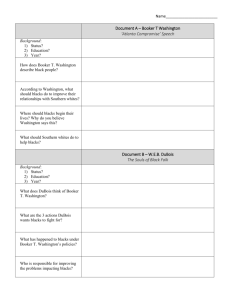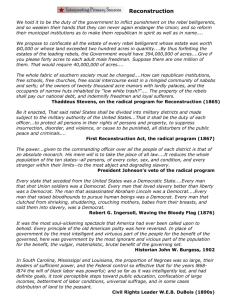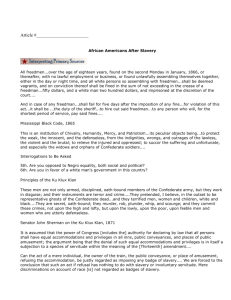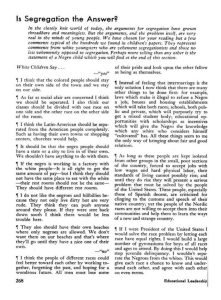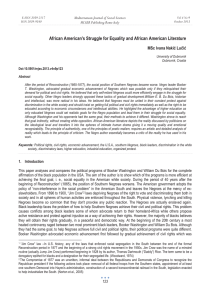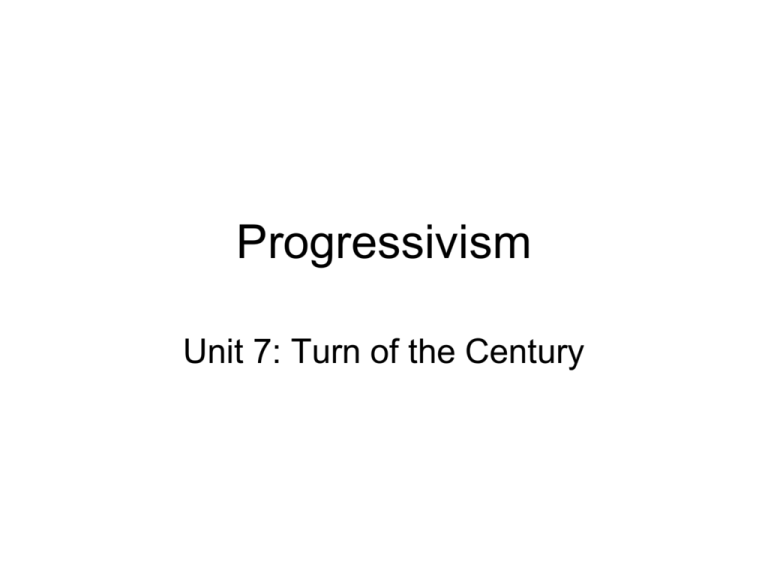
Progressivism
Unit 7: Turn of the Century
The Plight of African-Americans
• End of Reconstruction – what does that mean?
• Economics – what do blacks do?
• North-South Reunion – what does that mean?
• Rise of Populism – what does that lead to?
• Social Darwinism – how do blacks fit in?
• Imperialism – implications for blacks?
• Immigration – how will blacks compete?
• Violence – Ku Klux Klan and lynchings
Big Question: How should blacks respond?
Alexis de Tocqueville
on American racism
The prejudice of race appears to be
stronger in the states that have abolished
slavery than in those where it still exists;
and nowhere is it so intolerant as in those
states where servitude has never been
known.
Tillman on Lynching
We of the South have never recognized the
right of the negro to govern white men, and
we never will. We have never believed him
to be the equal of the white man, and we will
not submit to his gratifying his lust on our
wives and daughters without lynching him.
Sen. “Pitchfork Ben” Tillman (S.C.)
Lynchings by Decade and Race
1600
1400
1200
1000
Blacks
Whites
Total
800
600
400
200
0
1880s
1890s 1900s
1910s
1920s
1930s
1940s
1950s
1960s
Causes of Lynching
Alleged Crime
Number Lynched Percent of Total
Murder
1,937
41%
Rape
912
19%
Attempted Rape
288
6%
Theft
232
5%
Assault
205
4%
Insult to a White
85
2%
Other Causes
1,034
23%
“Strange Fruit”
Poem by Abel Meeropol (1936); Song by Billie Holiday (1939)
Southern trees bear strange fruit,
Blood on the leaves and blood at the root,
Black bodies swinging in the southern breeze,
Strange fruit hanging from the poplar trees.
Pastoral scene of the gallant south,
The bulging eyes and the twisted mouth,
Scent of magnolias, sweet and fresh,
Then the sudden smell of burning flesh.
Here is fruit for the crows to pluck,
For the rain to gather, for the wind to suck,
For the sun to rot, for the trees to drop,
Here is a strange and bitter crop.
Billie Holiday - Strange Fruit
Ida B. Wells-Barnett (1862-1931)
Although lynchings
have steadily increased
in number and barbarity
during the last twenty
years, there has been
no single effort put forth
by the many moral and
philanthropic forces of
the country to put a
stop to this wholesale
slaughter.
Booker T. Washington
Atlanta “Compromise”
Our greatest danger is that in the great leap from
slavery to freedom we may overlook the fact that
the masses of us are to live by the productions of
our hands, and fail to keep in mind that we shall
prosper in proportion as we learn to dignify and
glorify common labor, and put brains and skill into
the common occupations of life;…No race can
prosper till it learns that there is as much dignity in
tilling a field as in writing a poem. It is at the
bottom of life we must begin, and not at the top.
Nor should we permit our grievances to
overshadow our opportunities.
Atlanta “Compromise”
To those of the white race who look to the incoming
of those of foreign birth…for the prosperity of the
South, were I permitted I would repeat what I say to
my own race, “Cast down your bucket where you
are.” Cast it down among the eight millions of
Negroes whose habits you know, whose fidelity and
love you have tested in days when to have proved
treacherous meant the ruin of your firesides. Cast
down your bucket among these people who have,
without strikes and labor wars, tilled your fields,
cleared your forests, built your railroads and cities,
and brought forth treasures from the bowels of the
earth, and helped make possible this magnificent
representation of the progress of the South....
Atlanta “Compromise”
…As we have proved our loyalty to you in the
past,…so in the future, in our humble way, we shall
stand by you with a devotion that no foreigner can
approach, ready to lay down our lives, if need be,
in defense of yours, interlacing our industrial,
commercial, civil, and religious life with yours in a
way that shall make the interests of both races
one. In all things that are purely social, we can be
as separate as the fingers, yet one as the hand in
all things essential to mutual progress.
Earl Thorpe, The Mind of the Negro (1961)
The Booker Washington philosophy and program
were the first positive ones that the masses of
Negroes in America every had. Previous to 1865
these masses had an externally imposed lifeprogram which, for them, maybe be called negative
in nature; almost nowhere in their lives had there
been much opportunity or room for initiative,
advance, growth, or maturity….Here was the
central and great wrong of slavery to which the
beatings and other wrongs were subsidiary and
symbolic. For most southern Negroes…slavery
made true adulthood impossible.
Earl Thorpe, The Mind of the Negro (1961)
Limited though it was, Washington’s philosophy
and program had enough elements of positive
thought and action in them for the Negro to attain a
type of adulthood under them, and in this sense,
Washington offered an advance to his race and not
a retreat. Washington correctly saw that for most
of the freedmen even his philosophy-program was
revolutionary, and thus it is that…he conceived of
himself as a revolutionary leader.
Southern response to the dinner
“When Mr. Roosevelt sits down to dinner with
a Negro, he declares that the Negro is the
social equal of the white man.”
“…the most damnable outrage which [had]
ever been perpetrated by any citizen of the
United States…when he invited a nigger to
dine with him at the White House.”
The action of President Roosevelt in
entertaining that nigger will
necessitate our killing a thousand
niggers in the South before they will
learn their place again.
“[The presence of women at the dinner was
proof that, in the President’s mind, blacks
should] mingle freely with whites in the social
circle—that white women may receive
attentions from Negro men.”
“[The dinner] so saturated [the White House]
with the odor of the nigger that the rats [had]
taken refuge in the stable.”
W.E.B. Du Bois
Du Bois, “Of Mr. Booker T.
Washington and Others”
It startled the nation to hear a Negro advocating such
a programme after many decades of bitter complaint;
it startled and won the applause of the South, it
interested and won the admiration of the North; and
after a confused murmur of protest, it silenced if it did
not convert the Negroes themselves. To gain the
sympathy and cooperation of the various elements
comprising the white South was Mr. Washington’s
first task; and this, at the time Tuskegee was
founded, seemed, for a black man, well-nigh
impossible. And yet ten years later it was done in the
word spoken at Atlanta: “In all things purely social we
can be as separate as the five fingers, and yet one as
the hand in all things essential to mutual progress.”
Du Bois, “Of Mr. Booker T.
Washington and Others”
This “Atlanta Compromise” is by all odds the most
notable thing in Mr. Washington’s career. The South
interpreted it in different ways: the radicals received it
as a complete surrender of the demand for civil and
political equality; the conservatives, as a generously
conceived working basis for mutual understanding.
So both approved it, and today its author is certainly
the most distinguished Southerner since Jefferson
Davis, and the one with the largest personal
following.
The Souls of Black Folk
It is a peculiar sensation, this doubleconsciousness, this sense of always looking at
one’s self through the eyes of others, of measuring
one’s self through the eyes of others….One ever
feels his two-ness—an American, a Negro; two
souls, two thoughts, two unreconciled strivings; two
warring ideals in one dark body, whose dogged
strength alone keeps it from being torn asunder.
Booker T. vs. W.E.B.
• Read each quote and consider whether it sounds more
like BTW or DuBois. Sort the quotes into two columns.
• Once confident, write a brief summary (main idea) of
each quote in the proper column. Be sure to number it.
• At the bottom of the column, summarize the philosophy
of each man.
• Evaluate each man’s philosophy. What are the
pro’s and con’s of each? What would you expect to
be the white and black responses to each? Why?
• What are some factors or conditions that might
impede each man in implementing his philosophy?
Differing Philosophies
Booker T. Washington
•
•
•
•
W.E.B. Du Bois
Accepted white domination • Challenged white
oppression; wanted
in South; opposed agitating
government to change laws
for immediate change
• Favored a “Talented Tenth”
Emphasized teaching
who could lead blacks
blacks trades and skills
forward
(Tuskegee Institute)
• Organized NAACP to help
Saw money as a “little
blacks fight for equality
green ballot” more powerful
than votes
• Considered too “radical” by
most whites and some
Won praise from most
blacks
whites
“Drawing the Line in Mississippi”
History of Reform Movements
Jacksonian
Democracy
(1820-40s)
Jeffersonian
Democracy
(1800s)
Populism
(1880-90s)
Antebellum
Reforms
(1830-50s)
FDR’s
New Deal
Reforms
(1930s)
Progressivism
(1890s-WWI)
LBJ’s
Great
Society
(1960s)
Turn of the Century “Challenges”
• unchecked growth of the power of big business
• recent influx of millions of “new” immigrants
• growth of urban populations created health,
safety, and sanitation concerns
• increasing income gap between rich and poor
• violent outbreaks between labor and capital
• corruption in government (bossism, machines)
• increasing segregation and violence in South
• women lacked suffrage, equality
Early Critics of the “Gilded Age”
• Liberal Republicans (1872), civil service reform
• Henry George’s Progress and Poverty (1879),
advocated communal land-ownership
• Edward Bellamy’s Looking Backward (1888),
advocated gov’t ownership/control of economy
• Eugene V. Debs, Social Democratic party (1897)
• Pragmatists (belief in experimental ideas), Henry
James, John Dewey
• Labor unions: Knights of Labor, AFL
• Farmer organizations: Grange, Alliances
• People’s (Populist) party, Omaha platform, silver
Progressivism
• middle-class Americans
(professionals, small
business owners)
• Social Gospel reformers
• muckrakers
• women (suffragettes)
• temperance advocates
•
•
•
•
Populists
laborers and labor unions
civil rights advocates
national political leaders
(TR, Wilson, Bryan,
LaFollette)
Progressive Goals
• Limit the power and influence of the big
business and the wealthy
• Improve democracy and make government
more accountable to the citizenry
• Improve the everyday lives of citizens
Tom L. Johnson
• influenced by Henry George’s
Progress & Poverty
• advocated “equal taxation” after
learning RRs and lighting companies
were undertaxed
• reduced streetcar fares to 3¢
• first city to own and operate public
service utilities (trolley system, water
system, electricity)
• Cleveland considered a national
model of responsible government
(“The City on a Hill”)
• Steffens: “The best mayor of the bestgoverned city in the United States”
Mayor Tom Johnson
holding a copy of
Progress and Poverty
“Fighting Bob” La Follette
• introduced the direct primary as a
means to undermine machines;
several states followed suit
• advocated for workers’
compensation, minimum wage,
railroad rate reform, progressive
income tax, direct election of
senators, and women’s suffrage
• “Wisconsin Idea” – use of WI’s
public colleges as “laboratory of
democracy” to aid in creating and
researching legislation
• won 17% PV as Progressive Party
presidential candidate in 1924
Republican
Convention
1912
“Bull Moose” Progressivism
The Latest
Arrival at the
Political Zoo
Woodrow
Wilson
Eugene V. Debs
Comparing the Platforms of 1912
• Complete the chart for your assigned party
by quickly reading the platform and writing
main ideas for each policy area. [10 mins.]
• Take turns sharing the key elements of each
of your party’s platforms with the rest of your
group. [4 x 2 mins.]
• Compare and contrast the platforms of all
four parties. Identify 2 or 3 distinguishing
features of each. [10 mins.]
Federal Power vs. States’ Rights
Democrats
Believing that the most efficient
results under our system of
government are to be attained by
the full exercise by the States of
their reserved sovereign powers,
we denounce as usurpation the
efforts of our opponents to
deprive the States of any of the
rights reserved to them, and to
enlarge and magnify by
indirection the powers of the
Federal government.
Progressives
Up to the limit of the
Constitution, and later by
amendment of the
Constitution, if found
necessary, we advocate
bringing under effective
national jurisdiction those
problems which have
expanded beyond reach of
the individual States
Banking and Currency
Democrats
…a systematic revision of our
banking laws as will render
temporary relief in localities
where such relief is needed, with
protection from control of
dominion by what is known as
the money trust….
We condemn the present
methods of depositing
government funds in a few
favored banks, largely situated in
or controlled by Wall Street…
Republicans
Our banking arrangements today need further revision to
meet the requirements of
current conditions….In
attaining these ends, the
independence of individual
banks, whether organized
under national or State
charters, must be carefully
protected…
Railroads and Telegraphs
Republicans
[The Republican party] placed
upon the statute-book the
interstate commerce act of
1887,…and the anti-trust act of
1890, and it has consistently and
successfully enforced the
provisions of these laws. It will
take no backward step to permit
the reestablishment in any
degree of conditions which were
intolerable.
Socialists
Anti-trust laws, railroad
restrictions and regulations,
with the prosecutions,…have
proved to be utterly futile and
ridiculous….
[W]e advocate…[t]he collective
ownership and democratic
management of railroads, wire
and wireless telegraphs and
telephones,… and all other
social means of transportation
and communication and of all
large scale industries.
Labor Issues
Democrats
Progressives
Socialists
Prohibit use of
injunctions
Protection of labor
unions
Shorter workday,
workweek
Prohibit, restrict
child labor
Minimum wage
Unemployment
insurance
Old-age pension
(“social security”)
Workers’
Compensation
Election of 1912
Socialist Electoral Progress
Year
Socialist Party
Socialist Labor Party
Total
1888
2,068
2,068
1890
13,704
13,704
1892
21,512
21,512
1894
30,020
30,020
1896
36,275
36,274
1898
82,204
82,204
1900
96,931
33,405
130,336
1902
223,494
53,763
277,257
1904
408,230
33,546
441,776
1906
331,043
20,265
351,308
1908
424,488
14,021
438,509
1910
607,674
34,115
641,789
1912
901,873
Wilson and Race
Federal Reserve Banks
Federal Reserve Notes
Election of 1916

!["What is this [African] American, This New Man?" Booker's Bucket vs](http://s2.studylib.net/store/data/010247134_1-fcc462a83585f7bf7b629277ca194edd-300x300.png)
